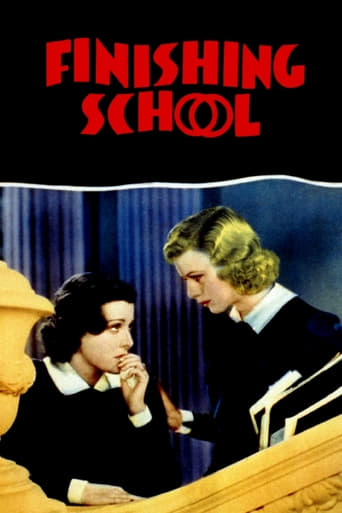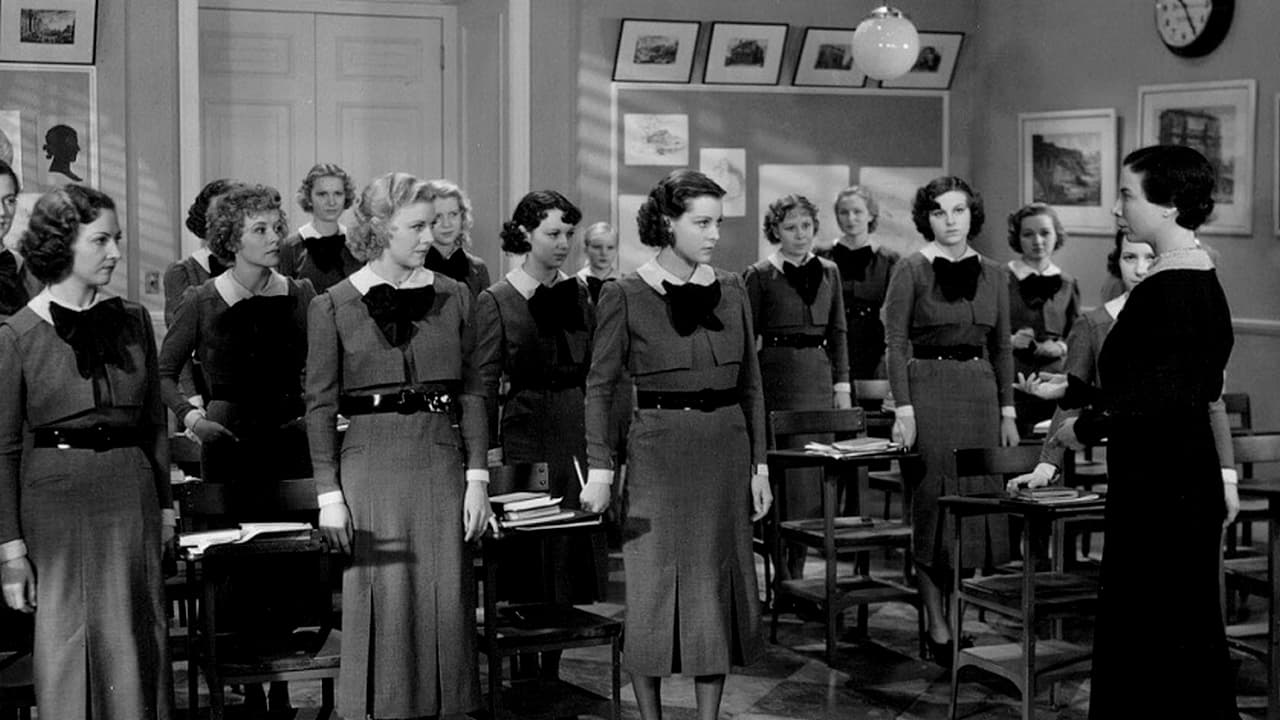ksf-2
Certainly some big names in this dated film from 1934. Pretty early-on in Ginger Rogers' film career... as well as Frances Dee's. Of course, the biggest name here is really Billie Burke, who not only married Ziegfeld of "Ziegfeld Follies"... but was also Glinda the Good Witch in Gone With the Wind! Here, Burke plays "The Mother" who sends her daughter Virginia (Dee) off to finishing school. Virginia rooms with "Pony" (Rogers), who shows her the ropes. Of course they get into all kinds of mis-haps, but poor Virginia keeps getting caught, and is pretty much ignored by her parents, who are too busy jet-setting with the other rich folk. It's rather dry, bland, and a dated story of the 1930s, showing how the rich folks lived prior to the market crash. Pretty far from anyone's experience today. Virginia meets local med student "Mac", who she hopes will take her away from her tortured life. It's all well done, but such a simple, out-dated story doesn't really hold up with today's world and moral standards. Lots of implied things going on, and we can tell why the film was put on the "condemned films" to avoid by the churches at the time. Made JUST prior to when the film code began to be enforced, and these subjects would be completely avoided. Kind of seems like it got much more serious and deep in the last 20 minutes of the film; up to then, it was all set-up. Originally a play by Katherine Clugston. Good to see Ginger Rogers and Billie Burke, years before their bigger roles.
vert001
Sound familial advice, indeed, but what I find most interesting about FINISHING SCHOOL is the contrasting character study it gives us between roommates Virginia (Frances Dee) and Pony (Ginger Rogers). Though quickly establishing a close friendship, they possess almost polar opposite personalities. Virginia is extremely high strung, as can be seen almost immediately. She spasmodically breaks a liqueur bottle to avoid breaking school rules even at the price of alienating her new schoolmates. When her boyfriend Mac (Bruce Cabot) is rudely turned away from a Sunday Tea at Crockett Hall, Vergie explodes rather unfairly at a young man to whom she's introduced at the social function. Later at her Christmas rendezvous with Mac, she tearfully asks him, no, she begs him to reassure her that she's really a "good" girl no matter what her teachers (Beulah Bondi) say. And at the end, her predicament drives Virginia to the verge of suicide. She's a girl who takes things very seriously, often too seriously for her own good.Her friend Pony, on the other hand, shows a devil-may-care attitude towards anything she encounters. School rules to her are not only made to be broken, this is actually the expected behavior from the girls. During their wild weekend in New York, Pony confidently tells her friend to "make the rules" and the football player will listen to them. It's no doubt true of Pony herself, but her innocent friend is completely at sea as to how to handle this aggressive young man (btw, exactly what has happened to Pony when Virginia is molested by the guy?). Much the same happens at the end when Virginia becomes frantic and hysterical at not hearing from Mac for a week while Pony immediately does the obvious and sensible thing by calling Mac on the telephone to explain to him the situation. It's not that Virginia isn't bright enough, it's that she's the kind to let her feelings overwhelm her, something that Pony would never do.Spoiler alert: I was rather embarrassed my first viewing of this film when I didn't figure out that Virginia was pregnant until she refused to be examined by the doctor (or was she just a nurse?). I understood that she'd slept with Mac in the boathouse that night, but I was thinking that Virginia's rising hysteria was just an overreaction to his apparently dumping her afterwards. Reading a few reviews of the movie told me that quite a few people never do pick up on the fact that she was pregnant. I still feel foolish, but perhaps a touch less so.It's a little strange to see Bruce Cabot in such a sympathetic role. He does well with it, though the character itself might be described as a bit too good to be true. Ginger Rogers is perfect as the sassy, somewhat rebellious schoolgirl, and is aided by having most of the best lines (though Billie Burke as Virginia's mother gets a few zingers as well), but the movie belongs to Frances Dee, who gives an exceptionally sensitive performance as an emotionally vulnerable adolescent going about the business of growing up. It's an interesting film from near the end of the Pre-Code era.
Fogo
A posh school that makes a big show of its moral codes, and party girl students like Ginger Rogers: there's a genre expectation here of a comedy pitting those two elements against each other - plucky students, goody two shoes students, stuffy teachers, cheeky classroom answers, flashlights under blankets, dormitory windows with trellises or trees to facilitate sneaking in/out. This isn't what the film is, although it plays with those expectations.For a start, it turns out that the institution and the party girls get on fine with each other. Rogers' character sees through the institution's preaching as a front for the "genteel racketeering" of extracting exorbitant fees from rich parents, and she understands that the school doesn't care what she does (or what sort of risks she runs) as long as she's sneaky about it and keeps up appearances.This comfortable arrangement is disturbed by Frances Dee, whose moral code the other characters find hard to categorise because it doesn't seem to forbid any particular behaviour or make a big thing about how moral it is - instead it's something along the lines of being true to oneself and living up to one's commitments.Both the institution and the party girls mistake her initially for a goody-two-shoes, so the institution approves and the party girls like Rogers disapprove. As the film develops, Rogers recognises that Dee's moral code is something to be admired and relied on, and Dee breaks the false dichotomy between a party girl and a goody two shoes by being curious, open minded, and willing to try anything once, but defining her own boundaries and being assertive about maintaining them. This independence soon enough confuses and confounds the school authorities, who crack down aggressively and vindictively on her attempts to find her own happiness.The best thing about the film is Frances Dee, who projects a sense of poise, patience, and decorum that's appropriate to the role (then again, some of the impression of poise and patience is probably accounted for by the fact that she's a timeless beauty who one doesn't feel in any hurry to look away from). The earnestness of her character can be tiring to watch - she's a serious, thoughtful young lady who meets a serious, thoughtful young man, and they have a serious, thoughtful relationship. Perhaps more could have been made of Rogers' character for cheekiness and dancing and comic relief, but that may say more about my own expectations for the film. My surprise at the twist the film took can probably also be attributed to my own expectations of the film and the character - thinking about it in retrospect, it's almost true by definition that serious, thoughtful people who follow their own moral codes are likely to do things that defy one's expectations - it's known as freedom.Because everyone is rich, it's harder to symphatise with their troubles (one wonders what Depression audiences made of being expected to feel sorry for the poor lonely girl who gets a $1000 cheque and a $2500 mink coat for Christmas instead of the company of her vacuous parents), and it requires suspension of disbelief not to expect that whatever trouble they get into, they'll be gotten out of it.Some of the commenters mention some ambiguity in the way the film gets a certain subject past the censors, but it's clear that the filmmakers didn't intend any ambiguity and that an adult audience of the time, familiar with the conventions, wouldn't have had any hesitations or doubts in understanding what was going on.It would be over the top to characterise the film as making any grand statements, but its observations about institutional codes and "genteel racketeering" are quite accurate and apply to more than fictional finishing schools - in a scene that hasn't dated at all, Dee's character is brusquely dismissed from a posh soiree for failing to pretend not to notice that the person she is being introduced to is a family member of a white collar criminal.
Maliejandra Kay
Helen Radcliff (Billie Burke) wants her daughter to attend the same finishing school that she did when she was young, so Virginia (Frances Dee) packs her bags and enters a new life of refinement. Miss Van Alstyne (Beulah Bondi) is a no-nonsense kind of a woman who briefs Virginia on the rules of the school and warns her not to step outside of the lines. Virginia agrees, but she never reckoned on having Cecilia (Ginger Rogers) for a room mate. Cecilia makes it impossible not to break the rules, and Virginia takes the heat for it. It doesn't help that Virginia falls for a poor medical school student (Bruce Cabot).This film starts out strong and ends strong, but the middle leaves a little to be desired. However, this is pure entertainment and escapism, just like the teen movies of modern times. There isn't a whole lot that is shocking about this film except the ending which is the reason why the film was condemned by the Catholic Church. By today's standards, it is nothing, and the twist is so ambiguous that a trained pre-code fan might be the only one that understands it.


 AD
AD


